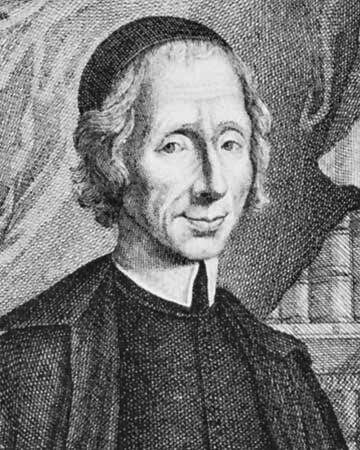Explore the profound philosophy of Nicolas Malebranche, the French metaphysician who developed his system on Cartesian thought. Dive into his theory of occasionalism, vision in God, and moral philosophy, and discover how his ideas challenged prevailing views on causation and perception. Learn about Malebranche’s lasting impact on modern philosophy and his influence on later thinkers like George Berkeley and David Hume.
Nicolas Malebranche; (1638-1715), French metaphysician, who developed his system on the basis of Cartesian thought. In the history of French metaphysics, he ranks second only to René Descartes. Malebranche was born in Paris on Aug. 6, 1638. He was the youngest child of Nicolas de Malebranche, secretary to Louis XIII, and Catherine de Lauzon, sister of a viceroy of Canada. In 1660, after studying theology at the Sorbonne, he entered the Congregation of the Oratory.
The essence of Malebranche’s philosophy is a sort of mystical idealism. As set forth in his brilliant work Recherche de la vérité ( 1674-1678; Search for the Truth), man has cognizance of things and objective realities as subjective thoughts and feelings through the idea that resides in his soul. But this idea is in God, so that we perceive everything in God (vision en Dieu) as the primal cause of all existences and things. Malebranche developed the famous doctrine of Occasionalism, or Interference, in accordance with which the objective thing and the subjective impression are made on every occasion to coincide by the direct interposition of God, in whom alone we think and feel.
In the history of philosophy, Malebranche may be regarded as the connecting link between Descartes and Spinoza. The difference between Malebranche’s philosophy and that of Spinoza is that to him the Universe was in God, whereas to Spinoza God was in the Universe. Malebranche died in Paris on Oct. 13, 1715.

Nicolas Malebranche Philosophy
- Occasionalism: Malebranche is best known for his theory of occasionalism, which he developed as a response to the mind-body problem. Occasionalism posits that there is no direct causal interaction between mind and body, or between material objects in general. Instead, all interactions are mediated by God.
According to Malebranche, God is the only true cause of everything that happens in the world. When we perceive what appears to be a causal relationship between two events (such as the movement of a billiard ball after being struck), it is actually God who directly causes both events to occur in a way that appears connected to us.
- Vision in God (Vision en Dieu): Malebranche’s philosophy of vision in God is closely related to his occasionalism. He argued that we do not directly perceive external objects, but rather we perceive ideas in the mind that are produced by God. When we “see” an object, what we are actually seeing is an idea that God has implanted in our minds.
This theory was a departure from the empiricist view that we directly perceive external objects through our senses. Malebranche’s vision in God theory emphasized the role of God as the mediator of all perception.
- Theodicy and Moral Philosophy: Malebranche also engaged in discussions on the problem of evil and the nature of morality. He believed that God’s goodness and omnipotence could be reconciled with the existence of evil in the world. Malebranche argued that evil is a necessary consequence of the finite nature of created beings and that it serves a greater purpose in God’s plan.
In his moral philosophy, Malebranche emphasized the importance of virtue and the pursuit of moral perfection. He believed that true happiness and fulfillment could be found in aligning one’s will with the divine will of God.
Legacy:
Nicolas Malebranche’s philosophy had a lasting impact on the development of modern philosophy. His occasionalism and vision in God theory challenged prevailing views on causation and perception. Malebranche’s ideas influenced later philosophers such as George Berkeley, who developed idealism based on similar principles, and David Hume, who engaged with Malebranche’s arguments on causation.
Malebranche’s emphasis on the role of God in perception and causation also had implications for theological discussions. His work sparked debates on the nature of divine intervention and the relationship between God and the created world.
Overall, Malebranche’s philosophy represents a unique blend of Cartesian rationalism, Christian theology, and innovative metaphysical speculation. His ideas continue to be studied and debated by scholars interested in the intersections of philosophy, theology, and epistemology.